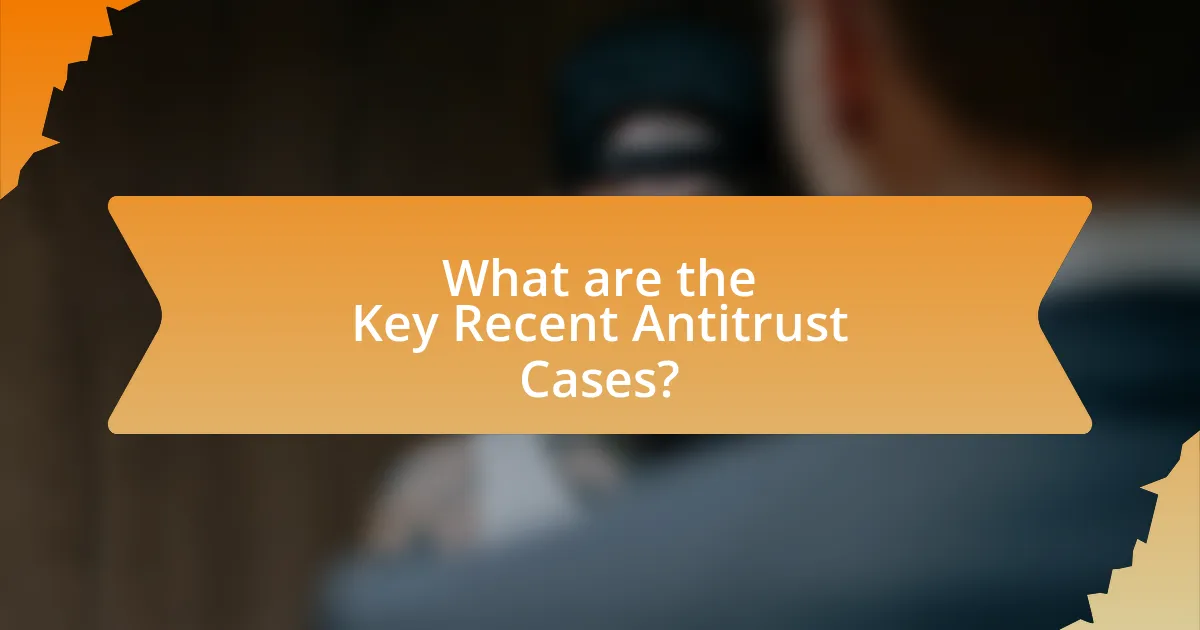The article focuses on recent high-profile antitrust enforcement actions, particularly those involving major technology companies like Google and Facebook. It outlines significant cases, such as the U.S. Department of Justice’s lawsuit against Google for monopolistic practices and the European Commission’s record fine against the company for abusing its market dominance. The article emphasizes the importance of antitrust enforcement for promoting fair competition and preventing monopolistic behaviors, detailing the historical context that shapes current regulations. It also discusses the impact of these actions on various industries, particularly technology, pharmaceuticals, and retail, and highlights compliance strategies businesses can adopt to mitigate risks associated with antitrust laws.

What are Recent High-Profile Antitrust Enforcement Actions?
Recent high-profile antitrust enforcement actions include the U.S. Department of Justice’s lawsuit against Google in 2020, which accused the company of maintaining its monopoly in online search and advertising through anti-competitive practices. Additionally, the European Commission imposed a record €4.34 billion fine on Google in 2018 for abusing its market dominance with Android. These actions reflect a growing global trend towards stricter antitrust scrutiny, particularly in the technology sector, as regulators aim to promote competition and curb monopolistic behaviors.
Why are antitrust enforcement actions significant for businesses?
Antitrust enforcement actions are significant for businesses because they promote fair competition and prevent monopolistic practices. These actions ensure that no single company can dominate a market to the detriment of consumers and other businesses, fostering an environment where innovation and consumer choice thrive. For instance, the U.S. Department of Justice’s lawsuit against Microsoft in the late 1990s aimed to dismantle its monopolistic hold on the software market, which ultimately led to increased competition and innovation in the tech industry. Such enforcement actions can result in substantial fines, changes in business practices, and increased scrutiny, impacting a company’s operations and market strategy.
What historical context shapes current antitrust enforcement?
The historical context that shapes current antitrust enforcement includes the Progressive Era reforms of the early 20th century, which aimed to curb monopolistic practices and promote competition. Key legislation, such as the Sherman Antitrust Act of 1890 and the Clayton Antitrust Act of 1914, established the legal framework for regulating anti-competitive behavior. These laws were enacted in response to the rise of powerful trusts and monopolies that threatened market fairness and consumer welfare. The enforcement of these laws has evolved, with significant cases like United States v. Microsoft Corp. in the late 1990s highlighting the ongoing relevance of antitrust principles in the face of technological advancements and market consolidation. This historical backdrop informs contemporary enforcement strategies, emphasizing the balance between fostering innovation and preventing anti-competitive practices.
How do recent actions reflect changes in regulatory priorities?
Recent actions in antitrust enforcement demonstrate a shift towards stricter regulatory priorities focused on promoting competition and addressing monopolistic practices. For instance, the increased scrutiny of major tech companies, such as the lawsuits against Google and Facebook, highlights a commitment to curbing anti-competitive behavior and ensuring market fairness. This shift is evidenced by the Federal Trade Commission’s (FTC) aggressive stance in pursuing cases that challenge mergers and acquisitions that could harm competition, as seen in the blocked merger between Nvidia and Arm. These actions reflect a broader regulatory trend prioritizing consumer welfare and market integrity over corporate consolidation.
What types of businesses are most affected by these actions?
Businesses in technology, pharmaceuticals, and retail sectors are most affected by recent high-profile antitrust enforcement actions. These industries often face scrutiny due to their market dominance and potential anti-competitive practices. For instance, major technology firms like Google and Amazon have been targeted for practices that may stifle competition, as evidenced by multiple investigations and lawsuits initiated by regulatory bodies. In pharmaceuticals, companies have been challenged over pricing strategies and patent manipulations that limit market access for generic alternatives. Retail businesses, particularly those with significant online presence, are also under examination for practices that may harm smaller competitors.
Which industries are currently under scrutiny?
The technology, healthcare, and financial services industries are currently under scrutiny. Regulatory bodies are investigating these sectors for potential antitrust violations, particularly focusing on issues like monopolistic practices and anti-competitive behavior. For instance, the U.S. Department of Justice has initiated actions against major tech companies for their market dominance, while the healthcare sector faces scrutiny over pricing practices and mergers that may reduce competition. In the financial services industry, regulators are examining the practices of large banks and fintech companies to ensure compliance with antitrust laws.
How do enforcement actions impact small versus large businesses?
Enforcement actions impact small businesses more severely than large businesses due to their limited resources and capacity to absorb legal costs. Small businesses often face significant financial strain from compliance costs and potential penalties, which can threaten their survival. In contrast, large businesses typically have more substantial financial reserves and legal teams to manage the implications of enforcement actions, allowing them to navigate these challenges more effectively. For example, a study by the American Antitrust Institute found that small firms are disproportionately affected by antitrust enforcement, as they may lack the ability to contest actions or adapt to regulatory changes compared to their larger counterparts.

What are the Key Recent Antitrust Cases?
Key recent antitrust cases include the United States v. Google LLC, where the Department of Justice accused Google of monopolistic practices in online search and advertising, and the European Commission’s case against Meta Platforms, Inc. for anti-competitive behavior related to data usage and advertising. In 2021, the Federal Trade Commission also filed a lawsuit against Facebook, alleging anti-competitive acquisitions of Instagram and WhatsApp. These cases highlight ongoing scrutiny of major tech companies and their market dominance, reflecting a broader trend in antitrust enforcement aimed at promoting competition and consumer choice.
What notable cases have emerged in the past year?
Notable cases that have emerged in the past year include the U.S. Federal Trade Commission’s lawsuit against Meta Platforms, Inc. regarding its acquisition of Within Unlimited, a virtual reality fitness company. This case highlights the ongoing scrutiny of big tech mergers and acquisitions. Additionally, the Department of Justice filed a lawsuit against Google for allegedly monopolizing the digital advertising market, which underscores the government’s commitment to enforcing antitrust laws in the tech sector. These cases reflect a broader trend of increased antitrust enforcement aimed at promoting competition and preventing monopolistic practices in various industries.
What were the outcomes of these high-profile cases?
The outcomes of recent high-profile antitrust cases include significant fines, changes in business practices, and increased scrutiny of corporate mergers. For example, in the case against Google, the company faced a $5 billion fine from the European Union for antitrust violations related to its Android operating system, which mandated changes in how it licenses its software. Similarly, the merger between AT&T and Time Warner was upheld by a federal court, setting a precedent for future mergers in the telecommunications industry. These outcomes demonstrate the regulatory environment’s impact on business operations and the importance of compliance with antitrust laws.
How did these cases influence public perception of antitrust laws?
High-profile antitrust cases have significantly shaped public perception of antitrust laws by highlighting their importance in promoting fair competition. These cases, such as the actions against major tech companies, have raised awareness about monopolistic practices and the need for regulatory oversight. For instance, the 2020 antitrust lawsuit against Google underscored concerns about market dominance and consumer choice, leading to increased public scrutiny of corporate behavior. As a result, public sentiment has shifted towards viewing antitrust laws as essential tools for protecting consumers and fostering a competitive marketplace. This shift is evidenced by growing support for stricter regulations and enforcement actions aimed at preventing anti-competitive practices.
What lessons can businesses learn from these cases?
Businesses can learn the importance of compliance with antitrust laws from recent high-profile enforcement actions. These cases highlight the necessity of maintaining fair competition practices to avoid significant legal repercussions. For instance, the Federal Trade Commission’s actions against major tech companies demonstrate that aggressive market strategies can lead to investigations and penalties. Companies must implement robust compliance programs and regularly train employees on antitrust regulations to mitigate risks. Additionally, businesses should conduct regular audits of their practices to ensure alignment with legal standards, as failure to do so can result in costly litigation and damage to reputation.
What compliance strategies can mitigate risks?
Compliance strategies that can mitigate risks include implementing robust training programs, conducting regular audits, and establishing clear reporting mechanisms. Training programs educate employees on antitrust laws and company policies, reducing the likelihood of violations. Regular audits help identify potential compliance gaps and ensure adherence to regulations, while clear reporting mechanisms encourage employees to report unethical behavior without fear of retaliation. According to the U.S. Department of Justice, companies with effective compliance programs are less likely to face severe penalties in antitrust cases, demonstrating the importance of these strategies in risk mitigation.
How can businesses prepare for potential investigations?
Businesses can prepare for potential investigations by implementing robust compliance programs and conducting regular internal audits. A well-structured compliance program includes clear policies, employee training, and a designated compliance officer to oversee adherence to regulations. Regular internal audits help identify potential issues before they escalate, allowing businesses to address them proactively. According to a study by the Association of Corporate Counsel, organizations with effective compliance programs are 50% less likely to face legal challenges. This evidence underscores the importance of preparation in mitigating risks associated with investigations.

How Should Businesses Respond to Antitrust Enforcement Actions?
Businesses should respond to antitrust enforcement actions by conducting a thorough internal review of their practices and ensuring compliance with antitrust laws. This involves assessing business operations, identifying potential antitrust risks, and implementing necessary changes to align with legal standards. For instance, companies can benefit from consulting legal experts specializing in antitrust law to navigate the complexities of enforcement actions effectively. Historical cases, such as the U.S. v. Microsoft Corp. in the late 1990s, illustrate the importance of proactive compliance measures, as companies that fail to adapt may face significant penalties and operational restrictions.
What proactive measures can businesses take?
Businesses can take proactive measures such as conducting regular compliance audits to ensure adherence to antitrust laws. By implementing a robust compliance program, organizations can identify potential risks and mitigate them before they escalate into legal issues. For instance, the Federal Trade Commission emphasizes the importance of training employees on antitrust regulations, which can significantly reduce the likelihood of violations. Additionally, businesses can engage legal counsel to review contracts and business practices, ensuring they align with current antitrust standards. This approach not only protects the company from potential fines but also fosters a culture of compliance and ethical conduct within the organization.
How can companies conduct internal audits for compliance?
Companies can conduct internal audits for compliance by establishing a structured audit plan that includes defining the scope, objectives, and criteria for the audit. This process typically involves identifying relevant regulations and standards applicable to the business, such as antitrust laws, and assessing current practices against these benchmarks.
To ensure effectiveness, companies should gather data through interviews, document reviews, and observations, followed by analyzing this information to identify gaps or areas of non-compliance. The findings should be documented in a report that outlines recommendations for corrective actions.
Regular training and updates on compliance requirements are essential to maintain awareness among employees. According to the Association of Certified Fraud Examiners, organizations with formal compliance programs are 50% less likely to experience fraud, highlighting the importance of internal audits in fostering a culture of compliance.
What role does employee training play in antitrust compliance?
Employee training plays a critical role in antitrust compliance by equipping employees with the knowledge and skills necessary to recognize and avoid anti-competitive practices. Effective training programs educate staff about relevant laws, such as the Sherman Act and the Clayton Act, and the consequences of non-compliance, which can include hefty fines and reputational damage. Research indicates that organizations with comprehensive training programs experience fewer violations and better compliance outcomes, as employees are more aware of legal boundaries and ethical standards. For instance, the U.S. Department of Justice emphasizes that ongoing training is essential for fostering a culture of compliance and preventing anti-competitive behavior within companies.
What are the best practices for navigating antitrust regulations?
The best practices for navigating antitrust regulations include conducting regular compliance audits, training employees on antitrust laws, and establishing clear internal policies. Regular compliance audits help identify potential risks and ensure adherence to legal standards, while employee training fosters awareness of antitrust issues, reducing the likelihood of violations. Clear internal policies provide guidelines for acceptable business practices, promoting a culture of compliance. These practices are essential as they align with the enforcement actions taken by regulatory bodies, which have increased scrutiny on anti-competitive behavior in recent years. For instance, the Federal Trade Commission has ramped up investigations into mergers and acquisitions, emphasizing the need for businesses to proactively manage their compliance efforts.
How can businesses stay informed about regulatory changes?
Businesses can stay informed about regulatory changes by subscribing to industry newsletters, attending relevant conferences, and engaging with legal experts. These methods provide timely updates on new regulations and enforcement actions, particularly in the context of antitrust laws. For instance, organizations like the Federal Trade Commission (FTC) and the Department of Justice (DOJ) regularly publish guidelines and updates that are crucial for compliance. Additionally, utilizing regulatory tracking tools can help businesses monitor changes in real-time, ensuring they remain compliant with evolving legal standards.
What resources are available for legal guidance on antitrust issues?
Legal guidance on antitrust issues is available through various resources, including government agencies, legal firms, and academic institutions. The Federal Trade Commission (FTC) and the Department of Justice (DOJ) provide official guidelines and enforcement actions related to antitrust laws, which can be accessed on their respective websites. Additionally, law firms specializing in antitrust law often publish articles, white papers, and offer consultations to help businesses navigate these complex regulations. Academic institutions also contribute through research papers and seminars focused on antitrust issues, providing valuable insights and analysis.
What practical steps can businesses implement today?
Businesses can implement compliance audits to ensure adherence to antitrust laws. Conducting regular assessments of business practices helps identify potential violations and mitigate risks associated with antitrust enforcement. For instance, the Federal Trade Commission (FTC) has increased scrutiny on mergers and acquisitions, making it crucial for companies to evaluate their market positions and competitive practices. Additionally, training employees on antitrust regulations fosters a culture of compliance, reducing the likelihood of inadvertent violations. Implementing these steps can significantly enhance a business’s ability to navigate the complexities of antitrust laws effectively.



